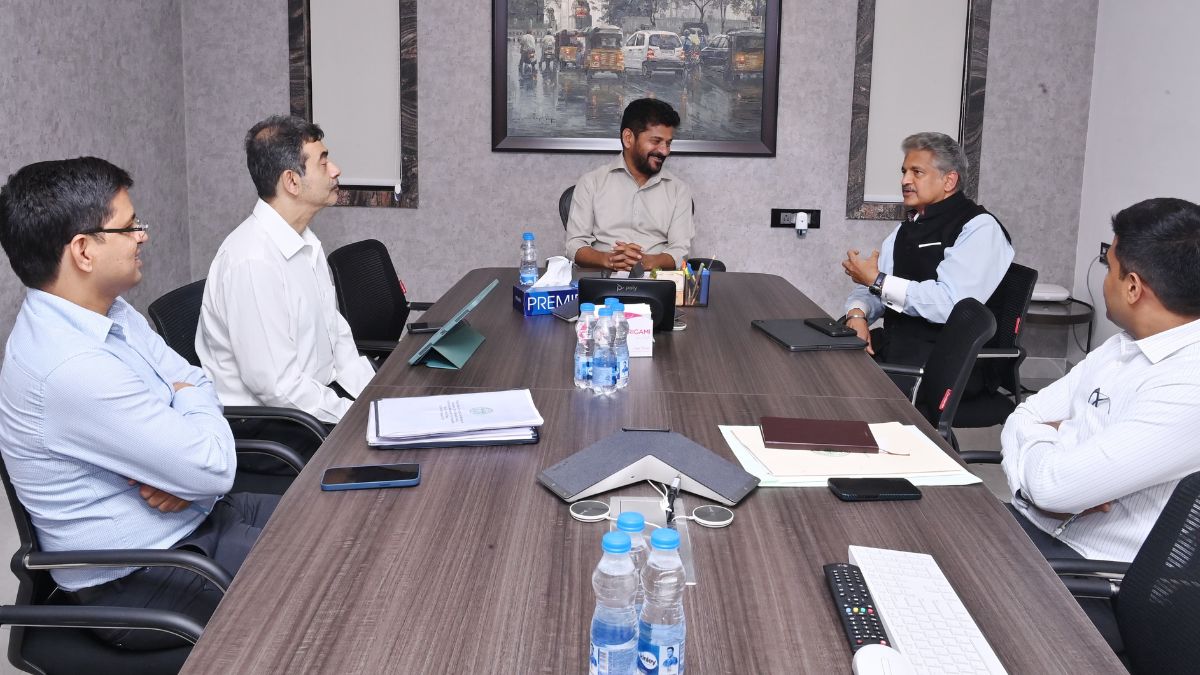The idea of 'Young India': Telangana taps into Gandhian legacy
 Telangana Chief Minister Revanth Reddy speaks to Mahindra Group chairman Anand Mahindra (2R)
Telangana Chief Minister Revanth Reddy speaks to Mahindra Group chairman Anand Mahindra (2R)
At a state-of-the-art skilling facility south of Hyderabad, picture a bunch of fresh engineering graduates learning the nuances of autotronics from seasoned engineers of Mahindra Group. Imagine a group of newly graduated nurses completing a 3-month finishing-skills course offered by the best of professionals from Apollo Hospitals.
At the end of the course, Mahindra and Apollo would pick them all and glowing careers would follow. Would you believe that all of this is being made possible from a government-established institute called the Young India Skills University (YISU) in Telangana?
Job-readiness, or the lack of it, among fresh graduates, is at the core of the idea behind Revanth Reddy-led Telangana government's launch of YISU in August 2024. Behind the thought of YISU is the chief minister’s decision to echo Mahatma Gandhi’s views on inherent value of college degrees.
Over a century ago, Mahatma Gandhi in his weekly journal Young India, wrote, "An academic grasp without practice behind it is like an embalmed corpse, perhaps lovely to look at but nothing to inspire or ennoble." Indian politicians rarely speak about having an under-skilled young population. Reddy acknowledged the elephant in the room.
Sadly, for as large a population as India's, Gandhi's words still hold true as an overwhelming section of today's graduates do not possess industry-standard skills. Gandhi’s idea of 'Young India' reflects "the voice of India" and hence, the underlying problem of education in India – ‘academic grasp without practice' – needs to be addressed. More so, in an AI-era.
Reddy, who swore-in as Telangana's chief minister in December 2023, was quick to sense this. Within months, he pooled in industrialists such as Anand Mahindra of Mahindra Group, Sanjeev Bikhchandani of Info Edge, and Suchitra Ella of Bharat Biotech, to bejewel YISU's Board of Governors.
Anand Mahindra was appointed chairman of YISU. He had even agreed to adopt the University's automotive department.
The chief minister appealed to the industrialists to become partners in YISU. The permanent campus for YISU is under construction in the proposed Bharat Future City, an ambitious net zero city project touted to become the next growth engine for Hyderabad.
Young India: Education and skilling reforms
The YISU was given the iconic prefix 'Young India' not just to do poetic justice, but to do real justice to the young Indians, by matching their skillsets with market needs through a self-reliant institution – and zero government intervention.
An initiative to push education and skilling concurrently, YISU's success would naturally trigger replication elsewhere in India. In the 1980s, Telangana's (erstwhile Andhra Pradesh) reforms in education were replicated as a model for India, especially with the launch of the Indira Gandhi National Open University (IGNOU).
India's first Open University, the Dr. B.R. Ambedkar Open University, Hyderabad, pioneered distance education with print, radio, and study centres. Its success proved the feasibility and impact of open learning in India. IGNOU went on to become the world's largest university in terms of student enrolment.
Reddy is the first CM since Bhavanam Venkatarami Reddy in 1982 to serve as the state's full-time education minister. He has plans for revolutionary educational reforms. This is an exception not just in Telangana or Andhra Pradesh, but also in recent Indian politics.
Telangana is building ultra-modern social welfare residential schools called as Young India Integrated Residential Schools in all the 119 assembly constituencies, with Rs 200 crore allocated for each school campus. Also, the Young India Police School was launched exclusively for the children of police personnel, while the Young India Sports University is being set up with a vision to produce future Olympians.
The state also prioritised revision of syllabus for B.Tech courses, incorporating emerging technologies like artificial intelligence into core engineering branches.
Inaugurating 65 Advanced Technology Centres (ATCs) — the upgraded Industrial Training Institutes (ITIs) — the chief minister recently announced a monthly scholarship of Rs 2,000 for students undergoing training at the new skilling centres.
The new ATCs were established as part of the state's partnership with Tata Technologies in modernising the ITIs across the state with a total project cost of Rs 2,324 crore. This is among India’s largest skilling initiatives by state governments.
The state government is working towards enrolling students in public schools right from pre-primary level. This bottom-up strategy is rooted in offering the crucial pre-primary education on par with corporate standards.
In 2014, Telangana was carved out as the 29th state of India and this triggered the need for a transformative and renewed approach in governance. Hence, the state had last year conducted the Socio-Economic, Educational, Employment, Political, and Caste Survey (SEEPC), a first of its kind in independent India, covering 3.54 people or 96.9 per cent of the state's estimated population.
Data from the survey is being used to take informed policy decisions and reforms, especially in education and employment.
While India could likely become the world's third largest economy in the coming years, unemployment continues to be a burning issue. And Telangana’s adoption of the idea of 'Young India' could take today’s young Indians a long way in such pursuit.
Anvesh Reddy P., a former journalist, currently works with the Telangana government.
India